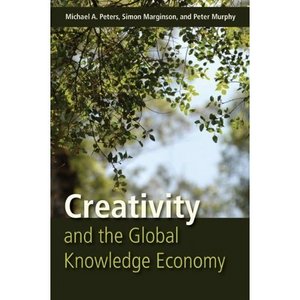Managing paradox in a world of knowledge
Murphy, Peter, and Pauleen, David (2009) Managing paradox in a world of knowledge. In: Peters, Michael A., Marginson, Simon, and Murphy, Peter, (eds.) Creativity and the Global Knowledge Economy. Peter Lang, New York, USA, pp. 257-276.
![[img]](https://researchonline.jcu.edu.au/23740/1.hassmallThumbnailVersion/23740_Peters_%26_Pauleen_2009_Book_Cover.jpg)
|
Image (JPEG) (Book Cover)
- Cover Image
Download (50kB) |
|
|
PDF (Published Version)
- Published Version
Restricted to Repository staff only |
Abstract
[Extract] In the 1960s and 1970s, advanced economies were propelled by the rise of the service sector. In the 1980s and 1990s, information and communication technology emerged as the leading sector of major economies. Today, the shift is towards the conceptual economy (Pink, 2005). As service industries attract low-wage workers and information jobs are moved off-shore, advanced high-wage economies are ever more reliant on success in research-based knowledge industries (Florida, 2002). Those industries have not appeared overnight. Examples reach back into the nineteenth century. In the decades after World War II, however, they reached a critical mass (Bell, 1999). Systematic auditing and commercialization of intellectual capital (IC) assets accelerated in the 1990s. Today, it is estimated that 20 per cent of IBM's profits come from its patent licensing (Hawkins, 2001, 108).
| Item ID: | 23740 |
|---|---|
| Item Type: | Book Chapter (Research - B1) |
| ISBN: | 978-1-4331-0425-1 |
| Date Deposited: | 09 Nov 2012 02:49 |
| FoR Codes: | 16 STUDIES IN HUMAN SOCIETY > 1608 Sociology > 160806 Social Theory @ 100% |
| SEO Codes: | 97 EXPANDING KNOWLEDGE > 970116 Expanding Knowledge through Studies of Human Society @ 100% |
| Downloads: |
Total: 8789 Last 12 Months: 2 |
| More Statistics |



